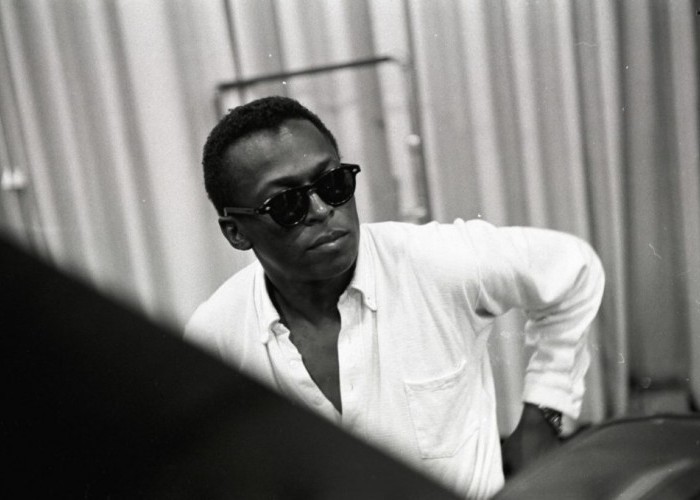Jan 13, 2026 2:09 PM
More Trump-Kennedy Center Cancellations
The fallout from the renaming of the John F. Kennedy Center for the Performing Arts to include President Donald…

Miles Davis during the ’Round About Midnight sessions in June 1956
(Photo: Don Hunstein/Sony Music Archives/Courtesy of Abramorama/Eagle Rock)Miles Davis was a difficult man. Even those who are passingly familiar with his biography know that to be true.
He was an on-again, off-again drug addict for much of his life—heroin and cocaine being his primary lures. He had a terrible temper. He was violent. He was extremely paranoid. He was often in pain. If he didn’t like you, you were a “motherfucker”—and if he did like you, then maybe you were a “motherfucker,” too.
Filmmaker Stanley Nelson’s new documentary, Miles Davis: Birth of the Cool, doesn’t shy away from that side of Davis. It’s a part of the trumpeter that’s inseparable from his allure, his understated charisma. How could such a troubled man have produced such beautiful music? That’s always been the question when considering Davis’ work, and Nelson doesn’t necessarily seek to answer it. He does, however, throw the question into relief, poking and prodding it, drawing out Davis’ many contradictions. The film has a spare and quiet vibe; it embodies the loneliness, the sense of alienation, that Davis seemed to have felt all his life.
“Not only is Miles’ music incredible—it spans so many eras, and it’s so influential. But Miles is also just a fascinating character and individual,” Nelson said, a few days before the movie’s Aug. 23 premiere at Manhattan’s Film Forum. Beginning in September, the film opens in select theaters nationwide. Nelson, whose previous documentaries include The Murder of Emmett Till and Jonestown: The Life and Death of Peoples Temple, said that he always had wanted to make a documentary about a jazz musician—“and who’s better than to make a film about than Miles?”
The movie follows, in chronological fashion, the peaks and troughs of the trumpeter’s life, beginning with his relatively privileged upbringing in East St. Louis, Illinois. It’s meant for initiates, but there still are some surprises for those who already are familiar with his work. We learn, for instance, that a young Davis liked to go into the woods and listen to the animals and play what he was hearing—a practice reminiscent of multi-reedist Eric Dolphy, who was known to imitate bird song and whom Davis once called a “sad motherfucker.”
Nelson lingers on Davis’ vast musical oeuvre, but it never feels as if he is checking anything off a list. Perhaps that’s because the movie is, in parts, narrated by an actor whose raspy voice serves as a stand-in for Davis. This gives the film an emotional weight that reinforces the narrative. Nelson also leaves ample room for the music itself, letting at least one song play in its entirety. (Nelson said he listened exclusively to Davis’ music for two years while making the film.) Additionally, there is never-before-seen archival footage that helps to humanize the man whose music shaped the evolution of jazz itself, from the time he first moved to New York in 1944 until his death in 1991 at age 65.

Belá Fleck during an interview with Fredrika Whitfield on CNN.
Jan 13, 2026 2:09 PM
The fallout from the renaming of the John F. Kennedy Center for the Performing Arts to include President Donald…

Peplowski first came to prominence in legacy swing bands, including the final iteration of the Benny Goodman Orchestra, before beginning a solo career in the late 1980s.
Feb 3, 2026 12:10 AM
Ken Peplowski, a clarinetist and tenor saxophonist who straddled the worlds of traditional and modern jazz, died Feb. 2…

The success of Oregon’s first album, 1971’s Music Of Another Present Era, allowed Towner to establish a solo career.
Jan 19, 2026 5:02 PM
Ralph Towner, a guitarist and composer who blended multiple genres, including jazz — and throughout them all remained…

Rico’s Anti-Microbial Instrument Swab
Jan 19, 2026 2:48 PM
With this year’s NAMM Show right around the corner, we can look forward to plenty of new and innovative instruments…

Richie Beirach was particularly renowned for his approach to chromatic harmony, which he used to improvise reharmonizations of originals and standards.
Jan 27, 2026 11:19 AM
Richie Beirach, a pianist and composer who channeled a knowledge of modern classical music into his jazz practice,…